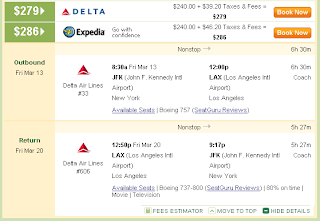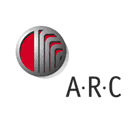
UPDATED:
We knew it was coming and now its live - in beta. TripAdvisor's new meta search product is being served up right on the home page. And TripAdvisor is sporting a breezy new logo with a an airplane and a new tagline to boot: get the best flights. then go.
Some early thoughts.....
TripAdvisor is pushing the "fees estimator" as a key selling feature... This handy item allows users to calculate the full cost of a trip including baggage charges. Somewhat humorously, it also will estimate on board charges - even down to if you want a cocktail. But, the fee estimator only appears to work for domestic tickets in the US.
 Another interesting feature is the ability to display seat maps by clicking on "available seats" which opens a new window for airlines which are available for sale via Expedia. (Sorry, AA) And, of course, seatguru (another TripAdvisor property) reviews are also included with a separate click.
Another interesting feature is the ability to display seat maps by clicking on "available seats" which opens a new window for airlines which are available for sale via Expedia. (Sorry, AA) And, of course, seatguru (another TripAdvisor property) reviews are also included with a separate click.
Hovering over a carrier's logo in the results page allows for some additional marketing messaging - try Alaska for example, and you'll see that they don't charge for the first bag. This is pretty cool functionality - but I'm not sure I would have found it had it not been pointed out to me by someone in the know!
 Another interesting feature is the ability to display seat maps by clicking on "available seats" which opens a new window for airlines which are available for sale via Expedia. (Sorry, AA) And, of course, seatguru (another TripAdvisor property) reviews are also included with a separate click.
Another interesting feature is the ability to display seat maps by clicking on "available seats" which opens a new window for airlines which are available for sale via Expedia. (Sorry, AA) And, of course, seatguru (another TripAdvisor property) reviews are also included with a separate click.
Hovering over a carrier's logo in the results page allows for some additional marketing messaging - try Alaska for example, and you'll see that they don't charge for the first bag. This is pretty cool functionality - but I'm not sure I would have found it had it not been pointed out to me by someone in the know!
Interestingly, TripAdvisor is also pulling in content from Travelocity, Hotwire and Expedia - but with little rhyme or reason from we can tell on a quick check of the site. Sometimes Travelocity is there, sometimes Expedia, sometimes both. It seems to be largely airline specific. The only constant is that none of the OTAs are shown with American Airlines - remember the Kayak/AA spat?
And, maybe showing TripAdvisor's parent Expedia's roots - its odd that the searching screen shows logos of intermediaries and distribution providers rather the actual suppliers that consumers crave. Indeed, many of the logos shown will probably mean nothing to most of the traveling public - we doubt many non-travel people know or care what ITA, Sabre or Amadeus are!
shows logos of intermediaries and distribution providers rather the actual suppliers that consumers crave. Indeed, many of the logos shown will probably mean nothing to most of the traveling public - we doubt many non-travel people know or care what ITA, Sabre or Amadeus are!
And, maybe showing TripAdvisor's parent Expedia's roots - its odd that the searching screen
 shows logos of intermediaries and distribution providers rather the actual suppliers that consumers crave. Indeed, many of the logos shown will probably mean nothing to most of the traveling public - we doubt many non-travel people know or care what ITA, Sabre or Amadeus are!
shows logos of intermediaries and distribution providers rather the actual suppliers that consumers crave. Indeed, many of the logos shown will probably mean nothing to most of the traveling public - we doubt many non-travel people know or care what ITA, Sabre or Amadeus are!
It also has some rather annoying "features" or lack thereof. While it is a beta launch, some lapses are glaring.
For instance, unlike Fly.com or Kayak.com there is no "search nearby airports" functionality - this really is annoying for those of us who live in multi-airport cities like New York or San Francisco.
The ability to sort for specific airlines is, frankly, backwards. If a user wants to zero in on a specific carrier (maybe because they have an addiction to AAdvantage miles or just love Virgin America) he/she must "unclick" all the other airlines rather than simply clicking on the airline they are interested in.
An interesting twist is showing layover time in connecting cities. Always good to know if I am going to be stuck in Atlanta for a few hours - but missing is the total elapsed time! Total elapsed time would seem to be a much better indicator than layover time - unless you are really desperate to spend some quality time in an airport along the way....
Still, given TripAdvisor's huge reach and loyal user base, we'll go ahead and predict this product (which doesn't seem to have a specific name) will ultimately be successful - if TA can convince people to think of them earlier in the travel booking process - before they have booked their airline tickets and are ready to think about hotels....












